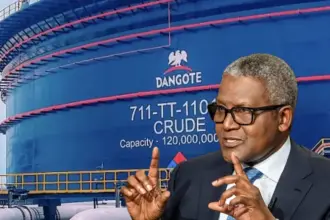-
Dangote Refinery Deploys 4,000 CNG Trucks for Nationwide Petrol Supply
-
Landmark initiative to cut logistics cost and boost fuel distribution efficiency
-
Dangote rejects offshore mooring system, says it would waste N1.5tr yearly
Dangote Refinery, CNG trucks, and nationwide petrol supply have converged in a landmark initiative as Africa’s largest refinery begins direct distribution of Premium Motor Spirit (PMS) across Nigeria using Compressed Natural Gas-powered trucks.
READ ALSO: Importers Accuse Dangote Refinery of Selling Petrol Cheaper Abroad than in Nigeria
The refinery confirmed that the first batch of its 4,000 CNG trucks, representing an investment of over N720 billion, will commence operations today, with the aim of slashing logistics costs, reducing environmental impact, and delivering cheaper energy to more than 42 million micro, small, and medium enterprises (MSMEs).
ATTENTION: Click “HERE” to join our WhatsApp group and receive News updates directly on your WhatsApp!
During a meeting with the AfricaRice Centre in Lagos, Chairman Alhaji Aliko Dangote explained that the decision to adopt direct trucking over the Single Point Mooring (SPM) offshore system was to eliminate avoidable handling charges that would have translated into N1.5 trillion annually.
The Refinery noted that if 40 million litres of PMS and 15 million litres of diesel were loaded via the SPM at an additional N75 per litre, consumers would bear the burden.
It added that bypassing intermediaries through direct trucking would not only save massive costs but also guarantee transparent delivery to Nigerians.
The initiative, which began in August 2025, was developed in partnership with Tetracore Energy Group, which supplies the natural gas used to power the fleet.
The trucks will transport refined products directly from the refinery, reinforcing Dangote’s push to avoid dependence on third-party carriers.
Last week, however, the Depot and Petroleum Products Marketers Association of Nigeria (DAPPMAN) accused the Refinery of quoting higher rates to local off-takers while offering lower prices to international buyers.
The group alleged that Dangote’s direct-to-market strategy was a move to monopolise the downstream sector, though Dangote insists the measure was a national imperative aimed at protecting Nigerian consumers.
With the trucks now rolling out nationwide, stakeholders say the development could reshape petroleum distribution, cut energy costs for households and businesses, and reposition Nigeria’s fuel supply chain for greater transparency and efficiency.



